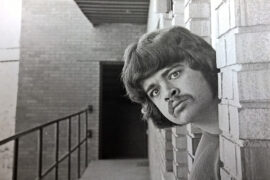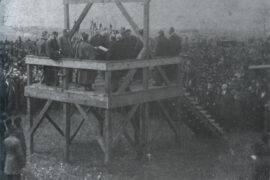Hospice of Huntington marks 40 years of excellence in alleviating suffering and offering support to individuals and their families.
By Katherine Pyles
HQ 119 | AUTUMN 2022
A lot has changed for Hospice of Huntington over the past 40 years. Founded by Laura Darby in 1982 as a volunteer organization at a time when few had even heard of the word “hospice,” the organization began hiring staff in 1983 after hospice care became recognized as a Medicare benefit. The changes since then have been tremendous: evolving regulations, therapies and technologies — even family dynamics and community demographics.
But one thing hasn’t changed, said President and CEO Melanie Hall.
“What’s stayed the same has been our intent to be patient- and family-focused,” said Hall, who has led the organization since 2014. “Folks are coming to hospice services at a very difficult, very fragile time in their lives. Our role is to make sure our values — honesty, empathy, accountability, respect and trust — are central in everything we do and in every service line we offer.”

Hospice’s early years were marked by overwhelming community support, which continues to this day. From the beginning, local individuals, churches and organizations donated supplies, office space and funds that allowed Hospice to provide end-of-life care regardless of a patient’s ability to pay. The organization quickly grew from a handful of volunteer nurses to a highly organized network of care providers, expanding beyond Cabell County into Wayne, Lincoln and Mason counties in West Virginia and Lawrence, Gallia and Meigs counties in Ohio. In 2006, the local community’s support took center stage with the opening of the Emogene Dolin Jones Hospice House.
“That was a tremendous financial undertaking from our community for the good of every person,” Hall said. “Not every community has a hospice house. We strive every day to make sure our hospice house continues to be the gift to the community it was intended to be.”
Hospice of Huntington continues to add services and programs, remaining true to Darby’s mission to provide palliative care to people nearing the end of life, including those with Alzheimer’s, dementia, cancer, COPD, congestive heart failure and other life-limiting conditions.
“Hospice focuses on quality of life and mitigating suffering, allowing people in the last phases of incurable disease to live comfortably and with dignity,” Hall explained.
Board chair Dr. Robert Stanton said it’s this purpose-driven commitment to the terminally ill that makes Hospice “the best of the best” in the region.
“The Hospice tradition is simple — to show kindness and support to families during times of their greatest need,” Dr. Stanton said. “This tradition was what Laura Darby envisioned for the organization 40 years ago. It was at the heart of Dr. J. David Daniels’ work as medical director from 1982 until his retirement in 2008 and was the passion and focus of Charlene Farrell during her 30-plus years as the organization’s executive director. And the tradition continues under Melanie Hall’s leadership.”

In 2018, Hospice opened Tri-State LifeCare, which provides care to those who’ve been diagnosed with a serious illness but don’t yet meet qualifications for hospice care.
“We saw people needing help a lot earlier, before they met the criteria for hospice services,” Hall explained. “Within the medical specialty of hospice and palliative medicine, hospice is the highest level of support. But care is needed at every stage of serious illness, even while curative treatments are underway. Tri-State LifeCare lets us provide palliative therapies and services to patients and families before they need hospice.”
Tri-State LifeCare, like Hospice, takes a multidisciplinary approach, working with a patient’s primary care physician and other providers to offer in-home palliative care, including private duty caregiving. The program serves patients in West Virginia, Ohio and Kentucky.
Hall said that while Hospice is “vigilant” about making sure it stays focused on its mission, it’s rewarding to find opportunities to better serve the Tri-State community. Future plans include opening a medical adult day care.
Of course, along with growth comes the ongoing need for community support. Donations to Hospice help fund things like Camp Good Grief, a free summer camp for kids who’ve lost a loved one, and free community bereavement programs. As it has since day one, Hospice provides care to patients whether or not they can pay for services; and donations from the community are vital in maintaining that commitment.
“We are blessed by the people who provide financial support to us,” Hall said. “The community has been gracious and generous in their donations to us for all these years, and their support allows us to continue to serve our community, both now and in the decades to come.”
Volunteers also play an important role, from those who serve on committees and assist with fundraising to those who work directly with patients and families.

“We have a volunteer coordinator who welcomes all our volunteers and provides great training for them so they feel comfortable with what they’re doing,” Hall said. “Volunteers are vital to our mission. We don’t take their involvement for granted.”
Forty years later, Hall said that Darby’s influence continues to guide Hospice of Huntington.
“Our community is blessed to have Laura, not just because of Hospice but also because of the countless other things she’s been involved in,” Hall said. “During her entire life, she has taken what’s in her hands and asked what she can do to help other people. That’s what we want Hospice to do — to take what’s in our hands and ask what we can do to benefit the communities we serve.”





